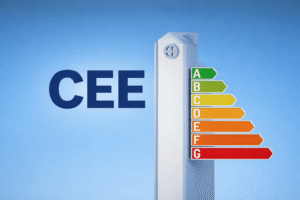(06/17/2025)
« Ultimately, Spain is more liberal than France when it comes to real estate,» Geoffroy Reiser.
On June 17th, our team was invited to the set of BFM's “experts de l’immo” to answer a recurring question among investors since the COVID crisis: is it better to buy in France or Spain?
On Marie Coeurderoy's program, Geoffroy Reiser engaged in a lively debate with Thierry Vignal, former president of Masteos (and therefore former colleague!), who has now embarked on the Atom adventure, the new Parisian proptech specializing in micro-living.
The replay is available here.
So, shall we watch the clásico again? Spoiler alert: Spain is playing at home.
Prices: 1-0 for Spain
This is the crux of real estate, and on this point, Spain wins hands down.
| FRANCE | SPAIN |
| Paris: €9,500/m² | Madrid, Barcelona: €5,000 – €6,000/m² |
| Lyon – Nice – Marseille: €3,500 – €4,000/m² | Valencia (3rd city): €2,900/m² |
| National average: €3,000/m² | National average: €2,400/m² (+14% in 1 year) |
Legend: Average price per m² in Spain – July 2025
Source: Idealista
- Prices per m² are often half as high in Spain as in France, with an annual increase of 14% in 2024.
- The market is still accessible, but under considerable strain.
Rental strain: 2-0 for Spain
Spain combines economic growth (GDP +3.6% in 2024) and a migratory boom.
It is the European country that welcomes the most new residents (+500,000 residents in 2024), attracted by its climate, dynamism, and quality of life.
- Result: record rental demand.
In Madrid, for example, there are an average of 120 applications for a single apartment for rent – that's three times more than in Paris, according to Thierry Vignal.
Furthermore, the supply is lagging, and there is currently a shortage of 2 million homes in the country, with nearly 3 million needed within 10 years.
- The imbalance is structural and favors landlords.
Legend: Spain will suffer a deficit of 2.7 million homes within 15 years.
Source: La Razón (11/19/24)
3-0 profitability for Spain
And... it's a hat trick for Spain!
In France, the profitability ranges between 4 and 5.5%. In Spain, the national average exceeds 6.7% (Fotocasa). Some regions are close to 8%, and an owner can expect more if they engage in seasonal or student rentals.
Legend: Average profitability in Spain since 2014
Source: Fotocasa.
In the country, 8 autonomous communities are above the average. Nothing to say then, on this aspect too, Spain maintains its lead.
Legend: Average profitability in Spain per autonomous community, 2024
Source: Fotocasa.
The rates: 4-0
Fourth goal for Spain. An improbable goal because Spanish rates have always been less favorable than French rates. This is therefore a major first.
At the beginning of the summer of 2025, Terreta Spain's teams assisted clients (residents) who secured rates at 1.90% over 25 years.
For non-residents, the rates are around 2.5-3%.
Thanks to the continuous decline of the Euribor, variable rate loans – which are the majority in Spain – are becoming very competitive again.
Legend: Euribor decrease in July 2025 (the monthly Euribor was at 2.525% in January 2025).
Source: Expansión.
In France, during the same period, investors can expect 3.10 – 3.20%.
4-0…
Ease of borrowing: a French advantage: 4-1
Okay, this point is indisputable: it is much simpler to borrow in France than in Spain.
- In France, the level of down payment required is the lowest in Europe. Unbeatable.
- In Spain, the down payment required by banks must cover 10% of the property price + purchase costs + renovation costs.
Let's also remember that on average, Spaniards become homeowners at 41 years old (compared to 34 years old for the French).
In Spain, the French buyer faces two scenarios:
- If they are a Spanish tax resident, they need to provide around €40,000.
- If they are a foreign tax resident, they should instead put around €60,000 on the table.
A slight nuance nonetheless, regarding the renovation aspect, Geoffroy reminded Marie Coeurderoy that "€1 invested in renovations translates to €2 of latent capital gain". Why? Because in Picasso's country, 80% of homes are energy sieves (INE), compared to 17% in France.
If you renovate, you're bound to make a good deal.
The administrative complexity favors Spain in a large part of the territory: 5-1
Ah... Regulation... In France, it works... sometimes a little too well, to the detriment of some lessors. In Spain, it's slow, and that favors informed investors.
Take the EPCs (Energy Performance Certificates) for example, at the time of sale, 50% of Spanish homes do not have an EPC, even though it has been mandatory since June 2013. That's just how it is. Everyone knows that homes are poorly insulated and inefficient, no one is very observant, and it's up to the buyer to decide for themselves whether or not to buy, renovate, or not. Don't count on a discount on the price, the argument doesn't hold.
The EU would like to legislate and harmonize, but it's not happening at the Spanish level.
In France, rent control limits room for maneuver. In Spain, despite some attempts at regulation, few cities actually apply it, and when they do, the market stalls (-20% of offers and rents +24% in Barcelona for example).
Result: a freer market and more flexible investment strategies, provided you choose your area carefully.
Conclusion: Spain wins the match without going into extra time.
Final score: 5-1 for Spain. A clear victory.
In France, investing often relies on leverage: maximum borrowing and optimized structuring. But rent control is there, EPCs too, and rental yields are rather average.
Spain: you need cash... but it's (well) worth it. In return, the buyer has more flexibility, less punitive taxation, and a significantly higher return, especially in growing areas like Valencia and its region.
The program Les Experts de l'Immo on BFM TV only confirms what we observe every day in the field, real estate in Spain is:
- More yield
- Less paperwork
- A stable legal environment
- Strong rental demand, driven by tourism, teleworking and European migratory flows
Why join the Terreta Spain team?
Because we transform your desire to invest in Spain into a turnkey project that is secure, profitable, and fast.
Our team helps you frame everything:
- Property search
- Profitability study
- Legal & tax support
- SL (Limited Company) creation if needed
- Rental & management
Curious? Discover one of our projects carried out in the heart of Cabanyal, the up-and-coming district in the country's third-largest city:
Want to go further? Download our complete brochure on terretaspain.com and discuss your project with our experts.
Sources: Fotocasa, Idealista, La razón, Expansión, BFM







